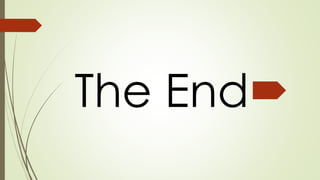Punctuation
- 2. Period . We use period at the end of a sentence. There is no space between the last letter and the period. Use one space between the period and the first letter of the next sentence. I told him what you said yesterday. We use period at the end of a command: Leave the building immediately. We use a period at the end of an indirect question: The teacher asked me to do the exercises. We use a period with abbreviations: Dr. John arrived Washington, D.C., at 6 p.m.
- 3. Comma , We use a comma to separate the elements in a series. He hit the ball, dropped the bat, and ran to first base. We use a comma+ a little conjunction(and,for,nor,but,or,yet,so) to connect two independent clauses: He was sick, but he went to school. We use a comma to avoid confusion: For most the year is already finished. (little confused) For most, the year is already finished.
- 4. Comma , Typographical reasons: Between a city and a state [SanaŌĆÖa, Yemen], a date and the year [March 24,1992], a name and a title [Helen Jimson, professor of English], in long numbers [1,456], etc. But without the date itself, however, the comma disappears: March 1992 was my birthday. In international or military format, no commas are used: The declaration of Independence was signed on 4 July 1776. In a tag question: You went to the party, didnŌĆÖt you?
- 5. Comma , To set off introductory elements: Running toward third base, he suddenly realized how stupid he looked. To set off parenthetical elements which mean a part of a sentence that can be removed without changing the essential meaning, is sometimes called ŌĆ£added informationŌĆØ. The founders Bridge, which is in Britain, is falling down. When both a cityŌĆÖs name and that cityŌĆÖs state or countryŌĆÖs name are mentioned together: Paris, France, is sometimes called ŌĆ£The city of lightŌĆØ.
- 6. Comma , Use a comma to set off quoted elements: Summing up this argument, Peter writes, ŌĆØ The purpose and strength of the romantic ŌĆ”ŌĆØ Use a comma to set off phrases that express contrast: Some say the world will end in ice, not fire. The puppies were cute, but very messy.
- 7. Question mark ? At the end of a direct question: Where have you been? With a tag question: He should quit smoking, shouldnŌĆÖt he?
- 8. Exclamation point ! Use it at the end of an empatic declaration, interjection, or command. ŌĆ£No!ŌĆØ he yelled.ŌĆØ Do it now!ŌĆØ It can be used to close questions that are meant to convey extreme emotion, as in What on earth are you doing! Stop! It can be accompany mimetically produced sounds, as in : The bear went Grr! and I went left. With titles: My favorite book is Oh, the Places YouŌĆÖll Go!
- 9. Colon : We use colon before a list or an explanation that is preceded by a clause that can stand by itself There is one thing left to do now: Confess while you still have time. YALI contains of that buildings: A, B, C, and D. To separate an independent clause from a quotation : I always use my favorite quotation from Helen Keller: ŌĆ£Life is an adventure, or nothing at all.ŌĆØ No colon after ŌĆ£includeŌĆØ Her recipe for Shafoot included garlic, salt, mint, and parsley.
- 10. Colon : No colon after ŌĆ£wereŌĆØ Her favorite breakfast cereals were Rice, Cheerios, and Wheaties. No colon after ŌĆ£wasŌĆØ Her usual advice, I remember, was ŌĆ£Live your life as if you act in a short film.ŌĆØ Use colon after explanatory statement There were four reasons for cancer: First, ŌĆ” Use colon after a salutation in a business latter Dear Khadijah:
- 11. Semicolon ; To help sort out a monster list We had four professor on our committee: Peter John, professor of Mathematics; Roland Pin, professor of English; John Green, professor of Education; and Nada light, professor of Nursing. To separate closely related independent clause My grandmother seldom goes to bed this early; she afraid sheŌĆÖll miss out on something. Use it instead of ŌĆ£BecauseŌĆØ word I phoned her; I wanted to make sure she is well.
- 12. Hyphen - Use hyphen for Creating compound words My six-year-old son, the out-of-date curriculum, the well-known actor Writing numbers Twenty-two, Ninety-nine Adding certain prefixes to words Non-English, A-frame, ex-husband, self-control, all-inclusive When the prefixes ends with the same letter that begins the word De-emphasize ,but not always unnatural, coordinate, cooperate
- 13. Dash To set off super-commas to set off parenthetical elements, especially when these elements contain internal forms of punctuation All for of them ŌĆö Bob, John, James, and Beter ŌĆö did well in placement. In writing dialogue, the dash used to show breaks in thoughts ŌĆ£How many times have I asked you not to ŌĆö ŌĆ£ James suddenly stop talking. Between dates, times, and numbers 1902-2003, 10:30-5:50 p.m., 13-C To show that someoneŌĆÖs name or a word has been omitted Professor ŌĆö and ŌĆö were suspended without pay for their refusal to grade papers.
- 14. Apostrophe ŌĆś Use (ŌĆśs)to show that one person/thing owns or is a member of something AmyŌĆÖs ballet class, LisaŌĆÖs car, RossŌĆÖs room, JohnŌĆÖs sports team Use apostrophe after the S at the end of plural nouns to show possession The parentsŌĆÖ bedroom, the JonesesŌĆÖ house. If a plural noun doesnŌĆÖt end in S add an S to create the possessive form The childrenŌĆÖs room When you combine two words to make a contraction TheyŌĆÖve (They have), weŌĆÖll (we will), arenŌĆÖt (are not)
- 15. Ellipses ŌĆ” When omitting a word, phrase, line, paragraph, or more from a quoted passage Full quotation: ŌĆ£Today, after hours of careful thoughts, we decided to sell the house.ŌĆØ With ellipses: ŌĆ£Today ŌĆ” we decided to sell the house.ŌĆØ Many writers use an ellipsis whether the omission occurs at the beginning of a sentence, in the middle of a sentence, or between sentences A common way to delete the beginning of a sentence is to follow the opening quotation mark with an ellipsis, plus a bracketed capital letter ŌĆ£ ŌĆ” [A]fter hours of carful thoughts, we decided to sell the house.ŌĆØ
- 16. Ellipses ŌĆ” Ellipses can express hesitation, changes of mood, suspense, or thoughts trailing off. Writers also use ellipses to indicate a pause or wavering in an otherwise straight forward sentence I donŌĆÖt know ŌĆ” IŌĆÖm not sure. Pride is one thing, but what happens of she ŌĆ” ? He said, ŌĆ£I ŌĆ” really donŌĆÖt ŌĆ” understand this.ŌĆØ
- 17. Parentheses ( ) Use parentheses to enclose information that clarifies or is used as an aside. We also use them with less important information. He finally answered (after taking five minutes to think) that he did not understand the question. He gave me a nice bonus ($500). Periods go inside parentheses only if an entire sentence is inside the parentheses. Please read the analysis(You'll be amazed.) Parentheses, despite appearances, are not part of the subject. Joe (and his trusty mutt) was always welcome. Joe (accompanied by his trusty mutt) was always welcome.
- 18. Parentheses ( ) Commas are more likely to follow parentheses than precede them. Incorrect: When he got home, (it was already dark outside) he fixed dinner. Correct: When he got home (it was already dark outside), he fixed dinner.
- 19. Brackets [ ] Brackets are far less common than parentheses, and they are only used in special cases. Brackets (like single quotation marks) are used exclusively within quoted material. Brackets are interruptions. When we see them, we know they've been added by someone else. They are used to explain or comment on the quotation. Examples: "Four score and seven [today we'd say eighty-seven] years ago..." "Bill shook hands with [his son] Demon. When quoting something that has a spelling or grammar mistake or presents material in a confusing way, insert the term sic in italics and enclose it in nonitalic (unless the surrounding text is italic) brackets. Examples: She wrote, "I would rather die then [sic] be seen wearing the same outfit as my sister."
- 20. ’é┤The End
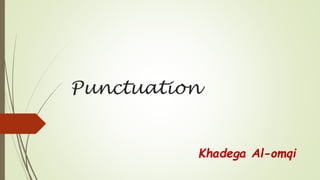
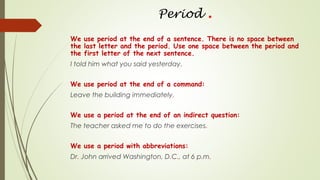
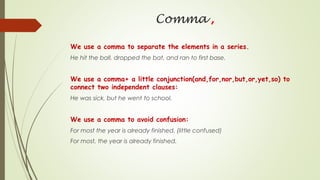
![Comma ,
Typographical reasons:
Between a city and a state [SanaŌĆÖa, Yemen], a date and the year [March 24,1992],
a name and a title [Helen Jimson, professor of English], in long numbers [1,456], etc.
But without the date itself, however, the comma disappears:
March 1992 was my birthday.
In international or military format, no commas are used:
The declaration of Independence was signed on 4 July 1776.
In a tag question:
You went to the party, didnŌĆÖt you?](https://image.slidesharecdn.com/punctuation-150331161954-conversion-gate01/85/Punctuation-4-320.jpg)
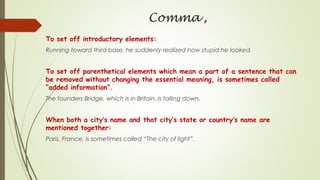
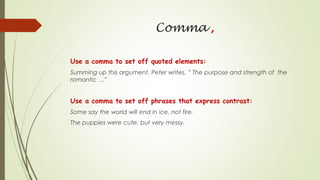
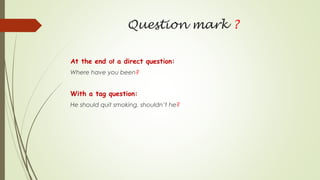
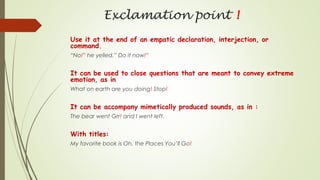
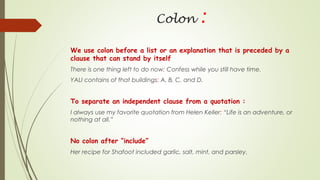
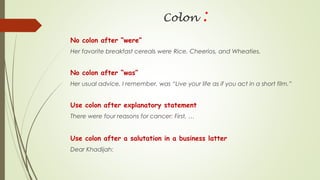
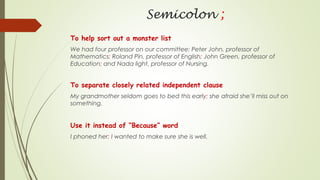
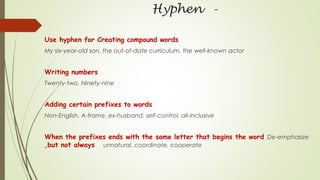
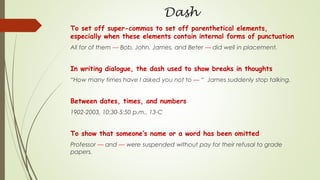
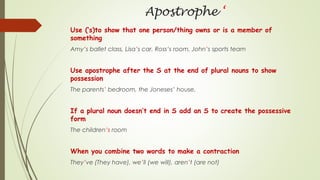
![Ellipses ŌĆ”
When omitting a word, phrase, line, paragraph, or more from a
quoted passage
Full quotation: ŌĆ£Today, after hours of careful thoughts, we decided to sell the
house.ŌĆØ
With ellipses: ŌĆ£Today ŌĆ” we decided to sell the house.ŌĆØ
Many writers use an ellipsis whether the omission occurs at the
beginning of a sentence, in the middle of a sentence, or between
sentences
A common way to delete the beginning of a sentence is to follow the
opening quotation mark with an ellipsis, plus a bracketed capital
letter
ŌĆ£ ŌĆ” [A]fter hours of carful thoughts, we decided to sell the house.ŌĆØ](https://image.slidesharecdn.com/punctuation-150331161954-conversion-gate01/85/Punctuation-15-320.jpg)

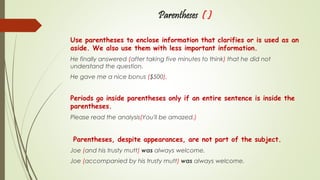
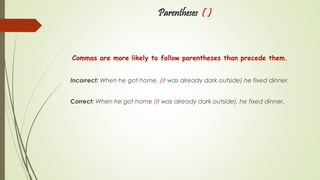
![Brackets [ ]
Brackets are far less common than parentheses, and they are only used
in special cases. Brackets (like single quotation marks) are used
exclusively within quoted material.
Brackets are interruptions. When we see them, we know they've been
added by someone else. They are used to explain or comment on the
quotation.
Examples:
"Four score and seven [today we'd say eighty-seven] years ago..."
"Bill shook hands with [his son] Demon.
When quoting something that has a spelling or grammar mistake or
presents material in a confusing way, insert the term sic in italics and
enclose it in nonitalic (unless the surrounding text is italic) brackets.
Examples:
She wrote, "I would rather die then [sic] be seen wearing the same outfit as my
sister."](https://image.slidesharecdn.com/punctuation-150331161954-conversion-gate01/85/Punctuation-19-320.jpg)
